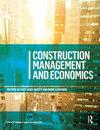Beyond barriers – exploring resistance towards BIM through a knowledge infrastructure framework
IF 3.3
Q2 BUSINESS
引用次数: 0
Abstract
Abstract Building information modelling (BIM) is a digital tool that offers the possibility to collect and share a multitude of data about a building and increase collaboration across professional borders. However, the uptake of BIM in the construction industry has been relatively slow, and previous research has shown how BIM creates tensions in the workplace. In this article, we explore the impact of BIM on socio-technical knowledge practices, to understand how these are enabled or restricted by the use of BIM. Through a qualitative case study in Sweden, this article analyses BIM through a knowledge infrastructure framework to explain the relatively slow uptake of BIM in a new light. The results show that BIM lacks embeddedness in governmental and corporate practices and regulations and that it sometimes leads to the marginalization of some professions through changed organizations and the slow process of changing complex knowledge infrastructures. This suggests that a critical discussion of the role of BIM in relation to professional flexibility, construction project process organization and power over technological development is vital for the future development of the construction sector.超越障碍——通过知识基础设施框架探索对BIM的阻力
本文章由计算机程序翻译,如有差异,请以英文原文为准。
求助全文
约1分钟内获得全文
求助全文
来源期刊

Construction Management and Economics
BUSINESS-
CiteScore
7.50
自引率
14.70%
发文量
58
期刊介绍:
Construction Management and Economics publishes high-quality original research concerning the management and economics of activity in the construction industry. Our concern is the production of the built environment. We seek to extend the concept of construction beyond on-site production to include a wide range of value-adding activities and involving coalitions of multiple actors, including clients and users, that evolve over time. We embrace the entire range of construction services provided by the architecture/engineering/construction sector, including design, procurement and through-life management. We welcome papers that demonstrate how the range of diverse academic and professional disciplines enable robust and novel theoretical, methodological and/or empirical insights into the world of construction. Ultimately, our aim is to inform and advance academic debates in the various disciplines that converge on the construction sector as a topic of research. While we expect papers to have strong theoretical positioning, we also seek contributions that offer critical, reflexive accounts on practice. Construction Management & Economics now publishes the following article types: -Research Papers -Notes - offering a comment on a previously published paper or report a new idea, empirical finding or approach. -Book Reviews -Letters - terse, scholarly comments on any aspect of interest to our readership. Commentaries -Obituaries - welcome in relation to significant figures in our field.
 求助内容:
求助内容: 应助结果提醒方式:
应助结果提醒方式:


